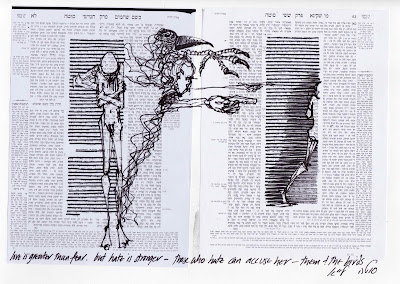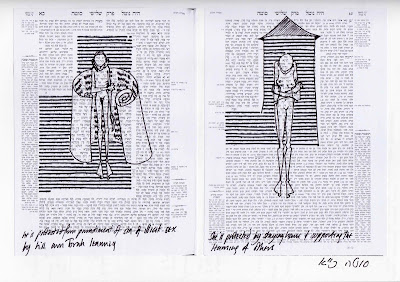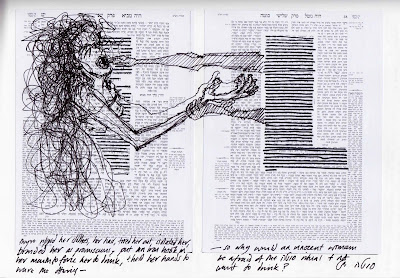love is greater than fear. but hate is stronger than love.
she can be accused of betraying love by those who hate her.
Them and the birds.
(if a woman is warned by her husband not to be alone with a particular man, only need one witness to see her for the husband to divorce her. even if that witness is his mother or sister. Women who elsewhere in the talmud are acknowledged as hating her. their prejudice is because she drains the family's resources but isn't really family. Earlier in the page is a discussion about serving God out of love is superior to serving out of fear. Sotah seems to be about servitude out of hate.)
daf yomi is the discipline of learning a page of Talmud a day. draw yomi is an on-line project to follow the daf yomi cycle and to respond each day with a drawing.
Thursday, 26 November 2015
sotah 30
the impure food within the pure. what can and can't be eaten, and if eaten, one becomes seemlessly part of the same purity status as the food.
but even though food is important - even nursing babies, disconnected from their mother's breast, to praise the revealed God.
but even though food is important - even nursing babies, disconnected from their mother's breast, to praise the revealed God.
sotah 29
chain reactions
the contagion of impurity,
and who does her death affect - the husband and/or the lover.
the contagion of impurity,
and who does her death affect - the husband and/or the lover.
sotah 27
triangle vs circle
triangle power hierarchy
the daughter is tainted by the mother, the people respond to the leader, the objects infected by the impure, and serving God out of fear
the democratic circle
the woman judged for her own acts, not her mother's; the people singing with the leader; and serving God out of love
triangle power hierarchy
the daughter is tainted by the mother, the people respond to the leader, the objects infected by the impure, and serving God out of fear
the democratic circle
the woman judged for her own acts, not her mother's; the people singing with the leader; and serving God out of love
sotah 26
those who define "not a man" to mean a boy, a non-jewish man, an invalid man, an animal
also considers that the painless child is a white boy...
... but they are missing something.
also considers that the painless child is a white boy...
... but they are missing something.
sotah 25
the men who aren't capable, or able, to make their wives fear them. (the mad, the deaf-mute, the imprisoned) - they have the power of the courts to keep the wives from misbehaving.
Saturday, 21 November 2015
sotah 24
the pregnant, the widow, the old and the barren - don't drink the bitter waters, but they don't receive their ketubah, their financial support.
but those married to sterile men, they have to drink. But if they are innocent, who fathers their sign-of-innocence/reward baby?
but those married to sterile men, they have to drink. But if they are innocent, who fathers their sign-of-innocence/reward baby?
sotah 23
he can be hanged from a tree, stoned naked, but he has control over the children's lives and will always be part of his priestly tribe.
whereas she can lose her status, and never had a say in what her children do, or go.
whereas she can lose her status, and never had a say in what her children do, or go.
sotah 22
judged for appearing pious, praying all day and abstaining from sex
and judged for appearing promiscious.
but God knows who is really righteous.
and judged for appearing promiscious.
but God knows who is really righteous.
sotah 21
he is protected from punishment from the sin of illicit sex by his own Torah learning.
she is (temporarily) protected by staying home and supporting the Torah learning of others. but only temporarily...
she is (temporarily) protected by staying home and supporting the Torah learning of others. but only temporarily...
sotah 20
the passage of the sotah should be written in non-permanent ink so that it can be erased from the Torah.
good idea.
and while we're at it....
good idea.
and while we're at it....
sotah 19
they've ripped her clothes, her hair, tired her out, isolated her, branded her promiscious, held her hands to wave the offering, put an iron hook in her mouth to force her to drink...
... and they can't imagine why a healthy, innocent, woman would be afraid and refuse to drink...
... and they can't imagine why a healthy, innocent, woman would be afraid and refuse to drink...
sotah 18
how many times can she go through the humiliating, and exacting, ritual before she decides not to marry ever again?
sotah 17
from dust to dust...
the dust of Abraham scores scrolls, and whose letters are washed away, in water where only the dust is seen.
the dust of Abraham scores scrolls, and whose letters are washed away, in water where only the dust is seen.
sotah 15
specially prepared marble slab, with handy ring to get access for the dust.
to go with the offering, the food of those who eat on the floor.
(if sotah was so rare, or never done - why have a special slab for it?)
to go with the offering, the food of those who eat on the floor.
(if sotah was so rare, or never done - why have a special slab for it?)
sotah 14
God protects the sotah - by tiring her out into confessing, so she doesn't have to drink.
and protects and clothes the ones that God just exiled.
and protects and clothes the ones that God just exiled.
sotah 13
two funerals - one with all different peoples, bringing crowns & eyeballs.
and the other, who wrote the crowns, was alone. with God to bury him
and the other, who wrote the crowns, was alone. with God to bury him
sotah 12
the two prophetesses of Moshe's early life.
one who didn't know what she was seeing, and knew anyway.
and the other, the defiant half-hag, half-maiden, who waited to see what happened to what she knew.
one who didn't know what she was seeing, and knew anyway.
and the other, the defiant half-hag, half-maiden, who waited to see what happened to what she knew.
sotah 11
many babies were born in the open spaces, and emerged from the ground.
but one baby came from the water to those waiting for him
but one baby came from the water to those waiting for him
sotah 10
the women who set their sights on their man, and have their way. either by trickery or by his imprisonment.
poor Judah and Samson
poor Judah and Samson
sotah 9
she gazes at him, and her eyes bulge, stomach swells and thigh falls away.
he gazes at her, and becomes blind and weak
comparing the sotah's punishment that is measure for measure. to Samson's downfall
he gazes at her, and becomes blind and weak
comparing the sotah's punishment that is measure for measure. to Samson's downfall
sotah 8
tiring her out, humiliating her publicly - but what comparative punishment does her jealous accuser suffer?
sotah 7
but what if she's innocent?
can they be trusted to not see her in that way, once they have bared her breasts and disgraced her.
can they be trusted?
sotah is about the breakdown in trust in relationship. because of mistrust and jealousy, the wife has to undergo a publicly humiliating ritual...
can they be trusted to not see her in that way, once they have bared her breasts and disgraced her.
can they be trusted?
sotah is about the breakdown in trust in relationship. because of mistrust and jealousy, the wife has to undergo a publicly humiliating ritual...
sotah 6
perhaps she has no merit, and owes her life to those who weave at moonlight. or those who stay far away.
or...
...perhaps...
.......she's innocent?
or...
...perhaps...
.......she's innocent?
sotah 5
the arrogant man who is disturbed like the sea and connot live with another - either God or woman.
and God, who went to dwell on the lowly mountain.
and God, who went to dwell on the lowly mountain.
sotah 4
as the men gather, and compare notes on the speed of sex - no one asks their wives how long they would like it to take.
is it any surprise that arrogance leads to women finding lovers.
is it any surprise that arrogance leads to women finding lovers.
sotah 3
the jealous man warns her not to stray - but why should she stay in the house now that it is full of worms, and he being controlled by an evil spirit?
sotah 2
bringing a couple together is like splitting the sea -
being together has separation and distance at the heart of relationship. inviting suspicion and hatred, aloofness and alienation.
being together has separation and distance at the heart of relationship. inviting suspicion and hatred, aloofness and alienation.
goodbye mesechet nazir
I have now (eventually) uploaded all the drawings for mesechet nazir. It is out of order. But at the time of finishing learning nazir, I did upload the conclusion at the right time. to this links to an earlier blogpost where I wrote my concluding thoughts to this section.
goodbye mesechet nazir
ideally I would upload these drawings every day. ideally I would have a scanner that is reliable. ideally I would have a studio assistant to do this.
we are not living in an ideal world....
goodbye mesechet nazir
ideally I would upload these drawings every day. ideally I would have a scanner that is reliable. ideally I would have a studio assistant to do this.
we are not living in an ideal world....
nazir 66
wanting, lusting and yearning.
reward for saying the bracha first, eager to do the mitzvah.
vowing for your unwanted unborn child,
and lusting for a woman that can lead to a discharge.
all different forms of desire
reward for saying the bracha first, eager to do the mitzvah.
vowing for your unwanted unborn child,
and lusting for a woman that can lead to a discharge.
all different forms of desire
nazir 64
the theoretical pile of impurity and creeping things that float on the surface, and those hidden in the depths. discussions can continue indefinitely.
but the sun will set on it's own.
but the sun will set on it's own.
nazir 59
how to persuade a stranger in the market to join you in being a nazir?
- men and women have their own weapons, their own powers of persuasion.
- men and women have their own weapons, their own powers of persuasion.
nazir 57
the rabbis who curses the mother with dead sons,
while her husband still lives, the children must die.
while her husband still lives, the children must die.
Friday, 20 November 2015
nazir 56
learning directly from Moshe on Sinai. but can only learn directly. nothing inferred or derived.
no need to mention the in-between guys.
no need to mention the in-between guys.
nazir 55
travelling to another country - in a box that moves.
wouldn't you be tempted to look out and risk impurity?
wouldn't you be tempted to look out and risk impurity?
nazir 52
the disintegrating body of the small.
and the bones of the big.
how small can they disintegrate before they no longer considered impure?
and the bones of the big.
how small can they disintegrate before they no longer considered impure?
nazir 51
dusty bodies - alone, we become dust.
buried together so neither are distinct in death. lying side-by-side.
or inside?
buried together so neither are distinct in death. lying side-by-side.
or inside?
nazir 50
is a fetus a corpse, even without fully formed limbs and liquid.
and is viscous liquid really a liquid at all...
and is viscous liquid really a liquid at all...
nazir 49
can learn halacha from the mention of various family members.
- but have to keep fools out of the academy.
- but have to keep fools out of the academy.
Subscribe to:
Comments (Atom)

















































